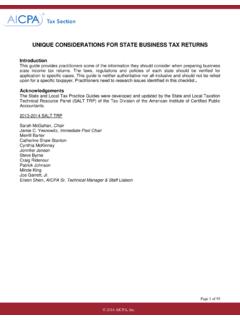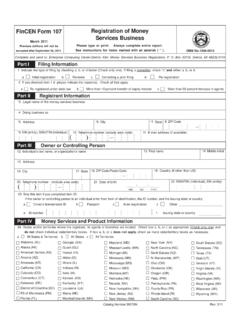Transcription of 2019 State Tax Nexus Guide - wp-ra-usa.com
1 2019 State tax Nexus guideReviewed Nov. 1, 2019Ta x S e c t i o n2019 State tax Nexus Guide | 12 Introduction3 Overview 3 Definition of Nexus 3 Constitutional Nexus requirements 3 The physical presence standard5 Sales and use taxes 5 Expanded Nexus provisions (click-through Nexus , affiliate Nexus , cookie Nexus and notice and reporting) 5 Click-through Nexus 5 Affiliate Nexus 5 Cookie Nexus 5 Notice and reporting 6 The evolution of economic Nexus 6 Economic Nexus 6 Federal legislative attempts 7 Multistate Tax Commission (MTC) voluntary disclosure8 Income, franchise and other State taxes 8 86-272 (15 381 384) 9 Economic Nexus for income and franchise taxes 9 History of economic Nexus cases for income and franchise taxes in the State courts 10 Factor presence Nexus 11 Affiliate Nexus and income taxes13 Conclusion Contents 2019 State tax Nexus Guide | 2 IntroductionThis practice Guide was developed by the AICPA Tax Section to inform practitioners about State tax Nexus issues.
2 Practitioners should refer to the bundle of resources contained in the 2019 Annual Tax Compliance Kit for further guidance on Nexus and State tax Guide is intended to be a broad reference tool concerning State Nexus issues. It is not intended to answer the question of whether a specific company has certain tax obligations in a particular State . The laws and policies of each State should be researched for application to each specific taxpayer s State tax Nexus Guide | 3 Overview Definition of nexusNexus describes the amount and degree of a taxpayer s business activity that must be present in a State for the taxpayer to become subject to the State s taxing jurisdiction or taxing power. For example, if a taxpayer has income tax Nexus in a State , it will be required to file returns and, subject to certain exceptions, pay tax on income earned in that State .
3 Similarly, if a taxpayer has sales and use tax Nexus , it will be required to collect and remit sales and use taxes on sales made to purchasers in that exercise their power to tax through tax imposition statutes. The amount of activity in or connection with a State necessary to create a tax collection or tax return filing obligation under these State imposition statutes is defined by State statutes, case law or regulations. Consequently, Nexus standards vary from State to State . Generally, State imposition statutes are broadly written using phrases such as doing business in or deriving income from to describe the State connection ( Nexus ) that triggers a business filing obligation. In addition to State law, the Constitution and federal statutes limit a State s power to tax.
4 Federal and State case law has interpreted these federal limitations on State taxing power. Determining where an entity with a multistate presence may have Nexus can be a challenge. Unless the imposition of taxation violates the Constitution or, for taxes based on income, Public Law 86-272 ( 86-272), an entity generally will have tax Nexus in states in which the entity has production activities, offices, facilities, employees or tangible property. Additionally, an entity may have Nexus in states that have adopted economic Nexus or factor presence Nexus standards if the entity meets or exceeds the State s thresholds. These economic Nexus policies have been broadly attempted for both income tax and sales and use tax considering the recent decision in South Dakota v.
5 Wayfair Inc., No. 17-494 ( 6/21/18). Constitutional Nexus requirementsThe Constitution s Nexus requirements are based on the Due Process and Commerce Clauses. While the language of these clauses does not directly address State taxing power, the clauses have been interpreted by the Supreme Court to protect taxpayers from the imposition of a State tax if the taxpayer lacks a sufficient connection or Nexus with the taxing State . The Due Process Clause protects taxpayers from a State tax if the taxpayer lacks the required minimum contacts with the taxing State . The physical presence standard Out-of- State sales tax collection and remittance requirements were notably addressed in National Bellas Hess v. Department of Revenue, 386 753 (1967). In this case, National Bellas Hess Inc.
6 , a mail-order company, challenged Illinois over its statute that required out-of- State retailers to collect and remit Illinois sales tax. Because the only connection National Bellas Hess Inc. had with Illinois was through common carriers and the United states mail system, it believed the statute was in violation of the Commerce Clause. The Court ultimately determined that physical presence was needed to establish Nexus for a State to require out-of- State businesses to collect and remit sales the case Complete Auto Transit Inc. v. Brady a decade later, a framework was established to identify if a taxpayer has substantial Nexus with the 1 The Due Process Clause states [No] State [shall] deprive any person of life, liberty or property, without due process of law.
7 Constitution, Article XIV, Section 1. The Commerce Clause states , Congress shall have power .. to regulate commerce with foreign nations, and among the several states , and with the Indian tribes.. Constitution, Article I, Section 8, Clause 3. 2 Mobil Oil Corporation v. Commissioner of Taxes of Vermont, 445 425 (1980). The Due Process Clause also requires a rational relationship between the income taxed by the State and the taxpayer s in- State Complete Auto Transit Inc. v. Brady, 430 274 (1977). The Commerce Clause also requires that a State tax be fairly apportioned, not discriminate against interstate commerce, and be fairly related to the services provided by the State tax Nexus Guide | 4taxing State . Specifically, a tax will be enforced if it (1) applies to an activity with a substantial Nexus with the taxing State , (2) is fairly apportioned, (3) does not discriminate against interstate commerce and (4) is fairly related to services the State In 1992, the Supreme Court reexamined the physical presence standard with another case Quill Corp.
8 V. North Dakota, 504 298 (1992). In this case, North Dakota s law requiring any business engaging in regular or systematic solicitation in the State to become registered for and collect and remit sales tax was challenged. In Quill, the Supreme Court reaffirmed that the Commerce Clause mandated that, absent action by the Congress to the contrary, a taxpayer must have some physical presence in a State to be subject to collection responsibility for the State s sales Based on Quill, it was clear that a business must have an in- State physical presence to be subject to an obligation to collect a State s sales tax. This standard recognizes that physical presence is needed to complete the Nexus prong of the Complete Auto framework. The presence of the taxpayer s in- State customers, without more, did not create Nexus and did not allow a State to impose a collection responsibility.
9 states have taken different positions concerning whether the physical presence standard enunciated in Quill applies to taxes other than sales tax. The decision does not directly address this issue, but many states took the position that Quill only applies to sales tax. 4 South Dakota v. Wayfair Inc.,138 S. Ct. 2020, 2091 (2018) (citing Complete Auto, 430 at 2795 Quill at State tax Nexus Guide | 5 Sales and use taxes Expanded Nexus provisions (click-through Nexus , affiliate Nexus , cookie Nexus and notice and reporting)While the Supreme Court may have affirmed the physical presence bright-line rule in Quill, that is not to say that the physical presence requirement has not been tested or its boundaries stretched prior to the Wayfair case. Presumably these standards are less relevant given the new economic Nexus standards discussed below, but taxpayers should be aware of them because these expanded Nexus provisions could result in a company having historical sales tax exposure, or prospective exposure if the company s sales do not meet a State s economic Nexus nexusIn 2008, New York enacted click-through Nexus legislation that requires out-of- State internet retailers to collect and remit State sales tax on tangible personal property or taxable services sold through links on websites owned by in- State residents, referred to as affiliates.)
10 6 The law provided a threshold requirement of at least $10,000 in gross receipts from referred sales. Since 2008, about 22 additional states have enacted similar legislation or issued guidance interpreting current State laws to allow comparable nexusIn 2010, Colorado took a different approach to taxing out-of- State sellers and enacted controlled-group Nexus . Under this law, out-of- State sellers must collect Colorado tax if they are part of a controlled group, defined by reference to the Internal Revenue Code, that has a component member that is a retailer with a physical presence in the The statute provides that the Nexus presumption may be rebutted under certain conditions. Since Colorado enacted its law, over 20 states have enacted some form of controlled-group nexusMassachusetts took a different position than other states on how to require tax collection from internet sellers.




